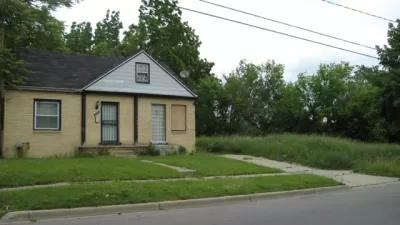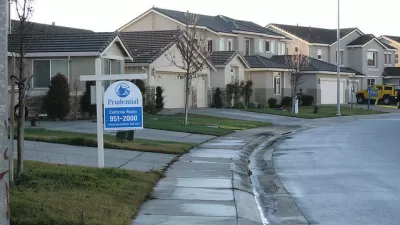Over one half of Detroit's foreclosed homes are blighted or abandoned. Buyers who purchased the homes for as little as $1 have little incentive to keep them in good shape—or pay taxes.

While Detroit has enjoyed sporadic rejuvenation, it continues to lose housing stock. Risky past lending is a key culprit. "The toll is massive: 56 percent of mortgage foreclosures are now blighted or abandoned. Of those 36,400 homes, at least 13,000 are slated for demolition at a projected cost of $195 million, The News found. The city lost another $300 million in tax payments from foreclosed homes that Wayne County seized for nonpayment of taxes."
Pre-2008, "Detroit had one of the highest rates of subprime lending in the country: 68 percent of all city mortgages in 2005, compared to 27 percent statewide and 24 percent nationwide, according to federal records."
While blight is also a function of faltering city services, the immense devaluation of foreclosed properties makes it easier for them to fall into a decrepit state. "Few efforts were made to hold institutions accountable for damage after those lenders blanketed city residents with risky loans, and then sold homes for as little as $1 after they were foreclosed on."
The lending industry claims no responsibility for what buyers do with their one-dollar homes. Quicken Loans founder Dan Gilbert, who co-chairs the Detroit Blight Removal Task Force, concurred. "[Gilbert] blamed high taxes and other factors. 'Existing blight causes other blight. Poor city services. All of it together.'"
It should be noted that, "All told, 52 percent of Quicken mortgages that ended in foreclosure from 2005-2014 are now blighted."
The article includes interesting slider visuals comparing blighted houses with their former inhabited selves.
FULL STORY: Foreclosures fuel Detroit blight, cost city $500 million

Planetizen Federal Action Tracker
A weekly monitor of how Trump’s orders and actions are impacting planners and planning in America.

Map: Where Senate Republicans Want to Sell Your Public Lands
For public land advocates, the Senate Republicans’ proposal to sell millions of acres of public land in the West is “the biggest fight of their careers.”

Restaurant Patios Were a Pandemic Win — Why Were They so Hard to Keep?
Social distancing requirements and changes in travel patterns prompted cities to pilot new uses for street and sidewalk space. Then it got complicated.

Platform Pilsner: Vancouver Transit Agency Releases... a Beer?
TransLink will receive a portion of every sale of the four-pack.

Toronto Weighs Cheaper Transit, Parking Hikes for Major Events
Special event rates would take effect during large festivals, sports games and concerts to ‘discourage driving, manage congestion and free up space for transit.”

Berlin to Consider Car-Free Zone Larger Than Manhattan
The area bound by the 22-mile Ringbahn would still allow 12 uses of a private automobile per year per person, and several other exemptions.
Urban Design for Planners 1: Software Tools
This six-course series explores essential urban design concepts using open source software and equips planners with the tools they need to participate fully in the urban design process.
Planning for Universal Design
Learn the tools for implementing Universal Design in planning regulations.
Heyer Gruel & Associates PA
JM Goldson LLC
Custer County Colorado
City of Camden Redevelopment Agency
City of Astoria
Transportation Research & Education Center (TREC) at Portland State University
Camden Redevelopment Agency
City of Claremont
Municipality of Princeton (NJ)



























